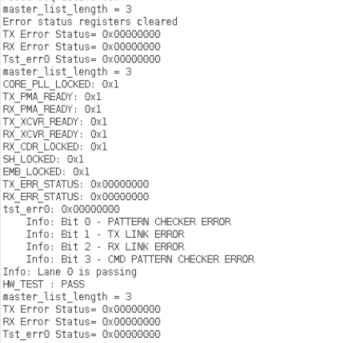Visible to Intel only — GUID: snt1551114724074
Ixiasoft
Visible to Intel only — GUID: snt1551114724074
Ixiasoft
3.5. Hardware Test for System Console Control Design Example
- Launch the System Console tool from Intel® Quartus® Prime (Tools > System Debugging Tools > System Console).
- In the TCL Console command prompt, type get_service_paths master to print a list of devices connected to your JTAG chain.
- Open the main.tcl script located in the ed/hwtest/ directory in any text editor of your choice and locate the following line.
set master_index [expr {$master_list_length - <your offset>}] - Adjust the master_index offset as necessary to reflect your JTAG chain configuration such that the master_index always points to the Intel Agilex® 7 device and save the file.
- In the TCL Console command prompt, navigate to the ed/hwtest/ directory (cd../ed/hwtest/) and execute the main.tcl script (source main.tcl). Your TCL Console window should resemble the following figure.
Figure 9. Source main.tcl
- Type start_basic_test at the command prompt to execute the link setup and test procedure.
This procedure executes a set of instructions to set up sysref on TX and RX as periodic , check PRBS pattern, configure the JESD204C IP PHY internal serial loopback mode and report link status.
The following figure illustrates the expected result from a successful link setup and test for a variant of L=4, M=8, and F=4 with a data rate of 16.22 Gbps.Figure 10. Successful Test in the System Console
Table 20. Procedures in the main.tcl System Console Script The table describes useful procedures in the main.tcl that may be helpful in debugging. Procedure Values Description get_service_paths {master} Reports all devices that are connected to the JTAG chain. Use this information to set the master index to point to the Intel Agilex® 7 device. get_master_index N/A Sets the targeted device master index. Use get_service_paths master to determine the offset of the Intel Agilex® 7 device in the JTAG chain, and edit the offset in this procedure accordingly. start_basic_test N/A Procedure that executes a set of instructions to set up SYSREF on TX and RX as periodic, check PRBS pattern, configure the JESD204C IP PHY internal serial loopback mode, configure PMA and to report link status. reset N/A Global reset xcvr_lpbk {0,1} 0: Disables internal serial loopback
1: Enables internal serial loopback
testmode {ramp, prbs7, prbs9, prbs15, prbs23 } ramp: Sets pattern generator and checker to ramp pattern
prbs7-23: Set pattern generator and checker to the respective PRBS patterns
sysref_type {oneshot, periodic, gperiodic } Sets the SYSREF type eval_test N/A 1. Loads status.
2. Checks lane by lane.
3. Shows the TX and RX registers values:
- rst_sts0:
- Bit 0 – Core PLL Locked
- rst_sts1:
- Bit 0-15 – TX PMA READY
- Bit 16-31 – RX PMA READY
- tx_status2:
- Bit 0-15 – TX XCVR READY
- rx_status2:
- Bit 0-15 – RX XCVR READY
- Bit 16-31 – RX CDR LOCKED
- rx_status4:
-
Bit 0-15 – SH LOCKED
-
- rx_status5:
- Bit 0-15 – EMB LOCKED
- tst_err0:
- Bit 0 – PATTERN CHECKER ERROR
- Bit 1 – TX LINK ERROR
- Bit 2 – RX LINK ERROR
- Bit 3 – COMMAND PATTERN CHECKER ERROR
read_err_status N/A Reads JESD204C IP error status registers. clear_err_status N/A Clears JESD204C IP error status registers read_rx_status0 N/A Reads JESD204C IP rx_status0 register. read_tx_status0 N/A Reads JESD204C IP tx_status0 register. read_rx_syncn_sysref_ctrl N/A Reads JESD204C IP syncn_sysref_ctrl register. wait_seconds {integer} Waits for {integer} seconds. wait_minutes {integer} Waits for {integer} minutes. run_load_PMA_configuration N/A Loads transceiver calibration presets. load_adaptation_PMA_configuration {0,1} - 0: Disables internal serial loopback.
- 1: Enables internal serial loopback.
1. Runs set operation mode. Checks if loopback and PRBS settings match the design requirements.
2. Polls registers 0x207, 0x80 = operation passed, and 0x81 = operation failed.
3. Runs load PMA configuration and load PMA configuration status check (0x40144 and 0x40143) if you turn on the Enable PMA configuration loading parameter in the parameter editor.
4. Starts calibration. Checks if loopback mode, load recipe enable, and PRBS settings match the design requirements. If PRBS is disabled, ensure that there is data sent from the core before starting calibration..
5. Polls registers 0x207, 0x80 = operation passed, and 0x81 = operation failed.
6. Runs check_cal_stat.
- Sets registers 0x203, 0x202, 0x201, and 0x200 to 0x97000001
- Polls registers 0x207, 0x80 = operation passed, and 0x81 = operation failed.
- Reads register 0x204. 0x80 indicates successful calibration.
- rst_sts0: